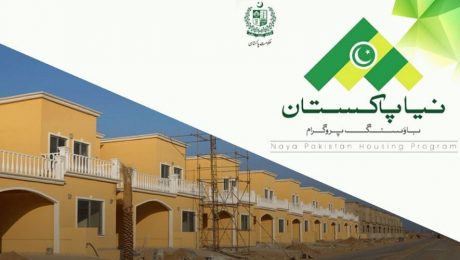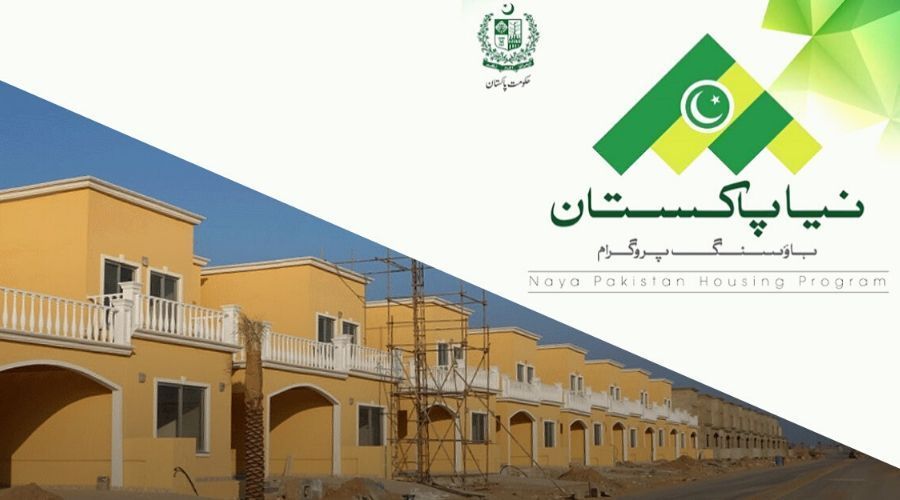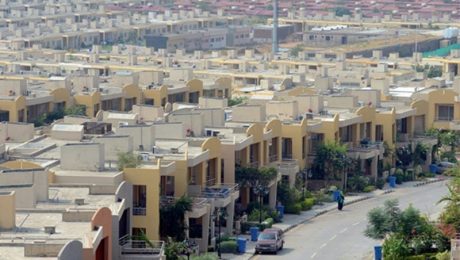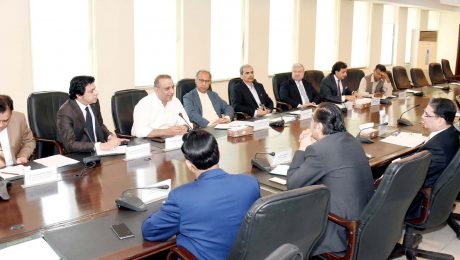HBL, DIBPL join hands to become lead advisors, arrangers for Eighteen
Karachi: HBL and Dubai Islamic Bank Pakistan Limited (DIBPL) have teamed up as required chief advisers and organizers for Eighteen (Elite Estates Pvt. Limited), a luxury residential house located in the twin cities of Islamabad and Rawalpindi.
The initiative is one of the largest union financial projects in the real estate sector with funding of Rs 7.5 billion by a banking consortium in Pakistan. HBL and DIBPL also serve as agents and investment agents respectively. Other members of the consortium include Bank Alfalah, Bank of Punjab, Habib Metro Bank, Industrial and Commercial Bank of China and Soneri Bank.
The agreements were signed by senior members of the consortium including HBL Corporate Head North Uzair Naveed Rabbani, Eighteen Chief Financial Officer (CFO) Aymen Ismail and DIBPL Chief Executive Officer (CEO) Junaid Ahmed. HBL president and CEO Muhammad Aurangzeb also attended the ceremony.
This four-year partnership will facilitate the development of Eighteen, an exclusive joint real estate project by Egypt-based Golden Developers, Saif Group and Kohistan Builders & Developers (KBD) of Pakistan. Located just 10 minutes from the New Islamabad International Airport, the large project occupies a focal place in the twin cities. With the goal of linking sophistication with comfort, Eighteen turns your dream of a luxurious lifestyle into a reality.
Eighteen CEO Tarek Hamdy said, “We thank the participating banks, especially the main organizers HBL and Dubai Islamic Bank, for successfully structuring and closing this important transaction. We believe it will open new financial avenues for real estate developers and help attract more We also thank the Government of Pakistan and the State Bank of Pakistan for helping to create a favorable environment that has really helped real estate like Eighteen to access the local banking market for their financial needs. We remain committed to delivering high quality. life, first of its kind in Pakistan. “
Commenting on the partnership, HBL president and CEO Muhammad Aurangzeb said, “The real estate industry in Pakistan has a lot of potentials and has seen significant growth in recent years. HBL is committed to developing the country’s real estate sector by advising government regulators and policymakers and helping to unite a structured framework to increase the development of this industry. According to the bank’s strategy to increase its footprint in the financial space for developers, HBL as the chief advisor and organizer of Eighteen will help facilitate the channeling of local and international investment in Pakistan. “
DIBPL CEO Junaid Ahmed said, “We are enjoying a strong relationship with Eighteen, which dates back to 2018 when we only arranged a union project financing facility for the first phase of the project. With this transaction, we have further extended our trust. and commitment to the project. Our parent, Dubai Islamic Bank PJSC has played a pivotal role in the UAE’s real estate development. In Pakistan, we are playing our part in helping to unlock the true potential of real estate which is also in line with the vision of the current government. ”
Watch this space for more information on that. Stay tuned to Feeta Blog for the latest updates about Pakistan Real Estate.
HBL, DIBPL join hands to become lead advisors, arrangers for Eighteen
Things to consider before purchasing a property
When choosing a house, you must take into account the physical condition of the property to the legal aspects that will allow you to know if the home of your dreams compares to or is identified with your lodging needs and spending plan.
Purchasing a house or condo is speculation that ought not to be trifled with. For this reason, it is so necessary to take into account certain aspects before becoming the owner of your own house or apartment.
So here is the list of things that you should keep in mind before buying a property:
Be minimalist when choosing a home

The process of looking for a house is very exciting; it is easy to get carried away by the most significant properties, those with the best decoration, the best floors or the best furniture. Those shine a lot brighter than small properties with simpler finishes.
The fact of the matter is, you will pay more for that additional room and for the conveniences. The proposal is that you begin visiting houses with costs that are near what you have saved. If you prefer to see it differently, start from the bottom and work your way up in case you can’t find something that stands out or, as the properties meet your needs and fit your pocket.
When you start your search in reverse, that is, visiting and idealizing the largest and most luxurious houses, those that are often out of the budget of a first-time buyer, you run the risk of biasing against tiny houses or apartments. Your base of comparison will be that dream home that is not necessarily a good investment since buying it would mean a tremendous financial weight and not a step in the formation of your wealth.
Keep an eye on the mortgage you take

Buying a house or apartment through a mortgage loan is the best option, but paying it off before 15 years is ideal. Choosing to finance for a term of fewer than 30 years allows you to pay less interest in the financial institution. This is because the 15-year mortgage is not only much shorter (which means you will be paying more principal each month), but you will also have a lower interest rate.
Do not exceed 40% of your salary in the payment of a property.

This is a good rule of thumb for financial health when buying a home or apartment. The first thing you should consider is the monthly payments of your existing doubts; then, you will have to add the monthly payment of a mortgage with a term of 15 years. If the total adds up to more than 40% of your monthly salary, then you are risking living on a tightrope, financially speaking, so you will have to reconsider or discard the purchase of that property.
If you exceed that percentage, we suggest you continue saving to buy that property or try to find properties with a lower price. Do not forget that there are expenses when buying a house or apartment that you must pay on your own even when you are granted a mortgage loan, for example, the deeds, the payment of taxes, the fees of the notary public and the real estate agent.
Furnish with the basics

Unless you buy a semi-furnished or fully furnished property, you will have to spend a good amount of money to purchase basic furniture and appliances.
One of the first things you will discover in the first days you spend in your new home is that it can look a bit empty and austere. The temptation to fill it as soon as possible will be latent. However, it is best to cover those gaps with second-hand or cheaper furniture. That way, you will meet your needs instantly, and you can update them eventually.
Doing this little by little will protect your pocketbook. Of course, avoid buying furniture on credit so as not to increase your debts and, much less, risk your savings or your emergency fund.
It is essential that you buy a house for the right reasons.

It is expected that if you reach a certain age, get married or have your first child, family or friends begin to ask you when you will buy a house. Social Pressure can be solid, and the assumptions of others can impact your choices. Make sure that it really is a personal desire and that you live the circumstances that make you feel secure about that vital acquisition.
To become the owner of your own home, you need to be financially and emotionally ready. Not only can home provide you with security and a sense of accomplishment, but it can also help you be financially successful.
Payment methods

Define how much of what you have saved you can use, since banks or housing support institutions only lend on average up to 80% of the property’s value, so you must have that 20% previously to give the down payment and 5% more to cover the initial costs (appraisal, insurance, deeds, notary, the opening of credit, etc.).
The location

If you are going to invest in a property, look for you to have the communication channels or services that you require, such as education, health, shops, security, transportation, recreation and supply. Avoid risk areas! What’s the significance here, that the property isn’t under high voltage lines, gas tanks, underground pipelines, close to gorges or territories in danger of flooding?
Meanwhile, if you want to read more such exciting lifestyle guides and informative property updates, stay tuned to Feeta Blog — Pakistan’s best real estate blog.
Things to consider before purchasing a property
Rs30bn subsidy announced for Naya Pakistan Housing Project
Naya Pakistan Housing Project
ISLAMABAD: The government has announced a special package for the construction sector which includes an amnesty plan, tax-free exceptions and a grant of Rs30 billion for the Pakistan Naya Housing Project, according to the Pakistan Economic Survey (PES) 2019-20.
The movement also expects other industries associated with the construction sector and will generate employment in the country.
Additionally, a stimulus package was also introduced to stimulate the country’s successful economy Covid-19.
According to the package, export-oriented industries would receive a tax refund worth Rs 100 billion and their interest payments will be delayed.
The government is giving a series of subsidies and incentives to the industrial sector, the survey noted.
These include subsidies to the industry for electricity and gas and an export development package.
Additionally, the Economic Coordination Committee (ECC) has approved a package of Rs 50.7 billion to give indirect cash flow support to the small and medium enterprises (SMEs) through prepaid electricity bills for the period May-July 2020.
This package will benefit about 3.5 million small businesses.
Rs30bn subsidy announced for Naya Pakistan Housing Project
- Published in ECONOMY, HEADLINES, Naya Pakistan Housing Authority, Real Estate, subsidy
Govt urged to introduce soft taxation regime for real estate sector
Soft taxation regime for Real estate sector
LAHORE: The government must formulate special policies and introduce a soft tax regime for the country’s real estate sector.
This was the result of the speeches made at a seminar on houses and real estate at the Commercial and Industrial Industry of Lahore (LCCI).
The seminar was attended by LCCI interim President Faheemur Rehman Saigal, Al-Jalil Developers Chairman Nasrullah Waraich, Federal Task Force on Housing Manager Zaigham Rizvi, renowned architects Professor Jason Pomeroy, Yaqoob Tahir Izhar, Akber Sheikh and Mian Abuzar Shad.
The experts noted that in Pakistan the population is growing rapidly, resulting in the expansion of residential areas and increased the need for food and other necessities.
LCCI interim president Faheemur Rehman Saigal said Pakistan is the only country in the region where residential areas are spreading every day, adding that no fundamental change in construction technologies has occurred since independence.
Citing an example from Singapore, he said in 1965-66, Singapore was one of the worst slums in the world. “But they’ve been working on it and now they have great community structures.”
He urged the government to take immediate measures to deal with the uncontrolled expansion of residential areas and consequent downsizing of the agricultural areas.
Saigal further stressed the need to bring the real estate sector within the formal economy, as it was the second largest sector in the context of employment.
The acting president of LCCI said real estate is an important sector of the economy that needs to be protected by favorable policies and a mild tax regime. “The sector has the potential to attract not only local investors but also foreign Pakistanis and foreign investors.”
He said the fungal growth of housing societies is consuming the agricultural land and is an agricultural land, Pakistan cannot afford it, suggesting that this issue could be addressed through horizontal housing developments.
“Despite being a dynamic sector with the capacity to attract huge foreign investment, the real estate sector has faced unfavorable circumstances and struggled to survive due to redundant policies and heavy taxation.”
He said the government will not be able to achieve its economic goals without the support of the business community, which suffers severely from the severe issues like attachment of bank accounts, political instability and heavy taxation on trade and industry.
Govt urged to introduce soft taxation regime for real estate sector
- Published in Business, ECONOMY, GOVERNANCE, HEADLINES, Lahore Chamber of Commerce and Industry, LCCI, policies, President, Real Estate, real estate sector, seminar, TAX POLICY, TAXATION
Hafeez Shaikh stresses need to incentivise real estate sector
Adviser to Finance Minister Dr Abdul Hafeez Shaikh on Monday stressed the need to encourage the real estate sector to attract investment from the Pakistani diaspora, reported Pakistan.
Presiding over a meeting to analyze the different financial models for “Naya Pakistan Economic Zone next to Islamabad Highway” in Islamabad, the councilor assured of the government’s support to the development of the housing sector as it has the potential to provide employment opportunities to the youth, Radio Pakistan reported.
He ordered the concerned officials to hold another meeting with all relevant stakeholders this week to analyze any financial plans prepared by the Naya Pakistan Housing Association (NPHA) for the above-mentioned project.
Earlier, NPHA (r) Lieutenant General Ameer Ali Haider informed the meeting about the general details of the project.
It has been reported that the project will be completed in three to four phases, starting from Faizabad and ending near Rawat.
“The Border Workers Organization is working with NPHA on the feasibility of the project. The aim is to complete the first phase after one year under the public-private partnership regime. Different financial models are being explored for the completion of the project in consultation with the State Bank of Pakistan and Federal Board of Revenue, ”he added.
Meanwhile, if you want to read more such exciting lifestyle guides and informative property updates, stay tuned to Feeta Blog — Pakistan’s best real estate blog.
Hafeez Shaikh stresses need to incentivise real estate sector
TRC Refines Valuation System for Immovable Properties
ISLAMABAD:
The Tax Reform Commission, led by state revenue minister Hammad Azhar, on Monday, decided to refine the system for valuing real estate, speeding up a process of tracking and tracing in the tobacco sector.
This would also include recommended procedures for taxing small entities involved in the retail trade, reports the Business Registrar.
The meeting discussed the topic of real estate appraisal and informed the participants that using appraisal tables was a tentative proposal and was not a long-term measure to appraise such real estate.
Moreover, from a review appraisal each time, a constant solution for the appraisal of real estate was proposed during the meeting.
The issue of a link between bank accounts and national tax numbers (NTN) for broadening the tax base was also discussed during the meeting.
Therefore, it was agreed to investigate the likelihood of effectively using the data of the National Database and Government Authority (Nadra) to bring potential people into the tax network.
The meeting also accepted the recommendation of the Implementation Committee on Tax Reforms (TRIC) to draft a simplified return form for small and medium-sized enterprises (SMEs).
According to officials of the Federal Revenue Board (FBR), the holding in the pursuit of a track record in the tobacco industry has contributed to a massive revenue loss of 40-50 billion a year.
Watch this space for more information on that. Stay tuned to Feeta Blog for the latest updates about architecture, Lifestyle and Interior Design.
TRC Refines Valuation System for Immovable Properties
- Published in ECONOMY, Federal Board of Revenue (FBR), HEADLINES, Investments, Market Overview, MARKETS, Minister of State for Revenue Hammad Azhar, National Database and Registration Authority (NADRA), Real Estate, Real Estate Guide, Real Estate Investments, real estate sector, Real Estate Trends, tax, TAX POLICY, Tax Reforms Commission (TRC), TAXATION, Tips & Advice, Valuation of Immovable properties, Widening tax net












